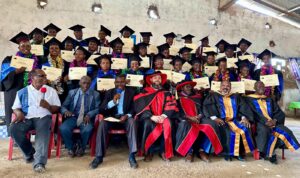The state of the Church today in many nations provides us with a clear indication that the Church as a whole needs to refocus efforts towards healthy discipleship and the proper development of new leaders. Before we take a deep dive, let’s approach this with a bit of context.
My good friend and Vice President of Joshua Nations shared with me his perception of the African continent. He said, “The African Church is a mile wide and an inch deep.” Over the past hundred years or so, many nations in Africa have been evangelized thoroughly, again and again. Millions upon millions have raised their hands to receive Jesus. Yet, overall, the African Church lacks depth and maturity.
Rev. Sarfraz William, our Director of South Asia, has expressed the ongoing need for holistic outreach to come alongside and partner with the evangelistic work and discipleship training taking place in South Asia. Over the course of numerous conversations, he has explained that for as long as memory serves, Christians have set out to approach his nation of Pakistan and other South Asian nations due to the sheer masses of unsaved people. I have personally partnered with Sarfraz and several of our other partners to preach at many large, evangelistic crusade-style events. At these events, we have seen tens of thousands raise their hands, come forward, and pray a “Sinner’s Prayer.” Did all these people remain committed to Christ? Unfortunately, a sizeable percentage ultimately returned to their former religions.
In Cuba, where Joshua Nations launched its first international work, we see a different scenario. The island is decimated due to its Communist leaders. The average Cuban makes only $10-$15 USD per month. Doctors and highly skilled professionals only make $22-$28 per month! One could assume that the church in Cuba would be equally dysfunctional. However, due to healthy discipleship the Church in Cuba is quite mature and healthy. Despite their extreme challenges, the Church sends church planters and missionaries all over the world. Missionaries are primarily sent to Spanish and Portuguese-speaking nations, but some have been known to be sent to Europe, Africa, and Asia. Our teams have run across Cuban missionaries in more than a dozen nations!
Here, in the United States, we have seen the Church struggle for decades. Sadly, thousands of churches have closed their doors over the past twenty years. Mega churches have sprung up and swallowed some smaller and mid-sized churches with the promise of bigger and better resources, healthier programs for children, and professional services that are often beyond the offering of a small or mid-sized church. Despite the fact that many of the mega churches are truly phenomenal, the state of our nation has not improved. The American Church has lost ground and lost influence.
Recently, we have seen the Lord begin something truly magnificent, something that often only happens once in a lifetime. Catching fire in Filmore, Kentucky, at Asbury Theological Seminary and now igniting in dozens of places around the world, a flame of revival is being lit. And it is turning the hearts of young and old back to the Father! With fresh outpourings of the Holy Spirit, we are witnessing something unique that could lead to a Third Great Awakening. Only time will tell…
Yet, no matter what happens in the coming months and years with this spark of revival, we will still have to work through the nuances of sustaining the growth of the Church. Together, we must grapple with building proper leadership and maturity so that however the Lord moves supernaturally through outpourings, signs, and wonders, we can look back on it and say, “Yes, Lord, we maintained Your harvest and built upon Your momentum.”
Matthew 28:19-20
“Go therefore and make disciples of all the nations, baptizing them in the name of the Father and of the Son and of the Holy Spirit, teaching them to observe all things that I have commanded you; and lo, I am with you always, even to the end of the age.”
We are to go and make disciples – not pew sitters, not hand raisers, not church members, and not just another number of another hand raised – but disciples. A disciple is a disciplined follower of Christ. This person loves to obey Jesus, makes every effort to conform to His Word, and to look more and more like Him every day.
Disciples are the kind of people that radiate Jesus and just seem to overflow with God’s love and goodness on a daily basis. Disciples are people that put Jesus first, others second, and themselves last. I could go on and on about what a disciple is and should be, but I am sure you get the picture! It is a great regret that many churches are not filled with disciples but are filled with Sunday morning bench warmers.
Of course, this is not all churches. And this is not all people!
This is not endemic to a particular size or style of church. The truth of the matter is that many people have not been discipled and many people do not know what it means to be a disciple.
This needs to change!
But how do we change the trajectory of the American Church or even the Global Church?
And how do we address the issues of promoting numbers and size instead of depth and maturity?
Leadership. The key to making a radical and rapid shift in the Global Church is addressing the issue of leadership, or the lack thereof.
1 Corinthians 4:15
“For though you might have ten thousand instructors in Christ, yet you do not have many fathers; for in Christ Jesus, I have begotten you through the Gospel.”
We lack leaders.
We lack fathers.
We lack people who are willing to take the time to invest in others.
The key difference between a teacher and a father is presence. A teacher shows up for a specified amount of time to instruct in some form or manner. Yet, when the time is over, the teacher often is unavailable. I know this is not supposed to be the norm and was not what a teacher/rabbi was like in Biblical times, but today teachers often disconnect from their student(s) when the specified time of instruction is complete.
Fathers, however, are those who not only offer instruction but also offer presence. They are involved in life decisions, surprises, tragedies, difficulties, and more. Fathers are there when you want them, when you need them, and even when you don’t realize that you need them. The Apostle Paul shared a powerful principle that is timeless. We need more fathers!
Wait!
I thought you just stated that the key of making a radical shift to the Global Church hinged on leadership!?
Yes, it does. However, leaders must recognize and release fathers as they are the ones who invest in true discipleship. Teachers play a role. Preachers play a role. Programs play a role. But true discipleship comes through relationships, and through relationships, new leaders and new disciples are cultivated.
Concluding thoughts –
- Recognize that programs are not discipleship. Programs can contribute to and help facilitate discipleship, but programs in themselves are not
- Teachers are not always disciple-makers.
Teachers are also not always fathers. - Fathers are not always traditional or conventional teachers.
- Fathers are people who will be present and teach along the way.
- They love, care, and correct, as needed.
- Leaders are often recognized by office or position.
This does not make them a father or a disciple-maker.- Positional leaders should recognize their giftings and limitations.
- Additionally, they should seek to mobilize and release people who are fathers, mentors, coaches, and disciple-makers.
- To see a rapid shift in your church culture, your leaders should identify, train, and release fathers.
- These concepts are not specific or limited to men only.
- Women are called and anointed to raise up others as well.
- For the sake of safety and integrity, I recommend that men mentor men and women mentor women.
Let us strive to raise up and release fathers.
Let us establish proper leadership.
And let us return to our mandate to make disciples!














